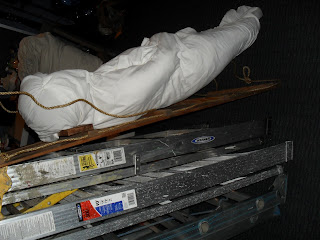To provide some examples of how this works, lets talk about this couch.
Option 1- Sacrifice Fast
If you decided that you were absolutely inflexible on quality and budget, this couch could be attained by searching and waiting for something similar to show up on craigslist or at a thrift store for a good price and then reupholstering and generally rehabbing it until it looked like you wanted. For this to happen, you would have to allow a significant length of time to complete the task. It could take weeks or months for a couch that was close enough to what you wanted to show up at a price you can afford. In order to allow this option to work, the best thing a director, designer or theatre company can do for me is to start meetings early. Meetings don't have to happen often, but if you can tell me 5-6 months out that you know you are going to want a large wooden canopy bed, it is much more likely I will be able to find it, than if you tell me 6 weeks out.
Option 2- Sacrifice Cheap
If time is not an option, and you are still inflexible on quality, this couch could be attained by doing a wide and extensive search (remember man hours=money because you have to pay workers). Once the piece was found you would be stuck paying whatever the seller or renter wanted to charge. Even if you don't have a large budget, this can sometimes mean that you set a certain prop as a priority and commit to spending what you need to achieve it, including being willing to sacrifice perfection in other places. For example you may decide that the perfect period stage sword is a priority and be willing to spend what you need to get it, then to make the budget work, be willing to use the table and dishes that were already in stock from another show even if they aren't absolutely perfect.
Option 3- Sacrifice High Quality
If you did not have very much time, and also have a limited budget, then it is time to sacrifice quality. This does not have to mean that you will end up with a trashy or cheap looking show, but it does mean flexibility. It means that you have to forget about the perfect couch, and start expanding your mindset so that when one of these couches shows up, you are ready to jump on a deal.
Sacrificing quality, at least in my world does not mean it will look bad, it just means flexibility, willingness to compromise and realistic expectations. It means that I might have had to borrow or rent the prop we are using so we can't change it or hurt it. It might mean that I can make the puppet's mouth or his arm move, but not both. It might mean that instead of buying something new, we find a way to alter something already in stock
As I have said before (quoting a friend, Sarah Miecielica) "theatre is art, on a schedule and with a budget." We would all like to have more money, more time, and more resources, but that is not the business that we are in. It is immensely helpful for the entire production team to come in with realistic expectations and, together, to develop a sense of which design elements are priorities and which are less important. That is not to say that miracles can't happen. I have experienced more than my share of theatre magic. Sometimes things that you need show up in alleys, sometimes a kind store owner or stranger lets you rent or borrow or buy something for far less than its actual value, sometimes a random friend comes out of the wood work to reveal that "oh, my dad has one of those in his garage he's being trying to get rid of," but those magical moments should be appreciated as the lucky gifts that they are. Plan-A should never be luck. It is always best to know, as early as possible in the process, what we will do if nothing lucky comes our way, and if we end up having to pay current market price for everything we need.










